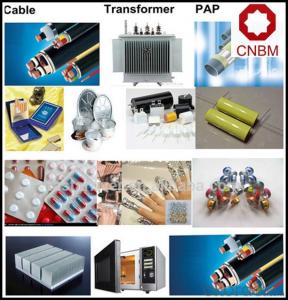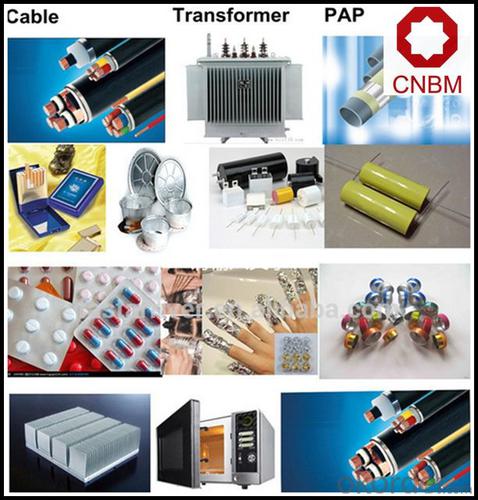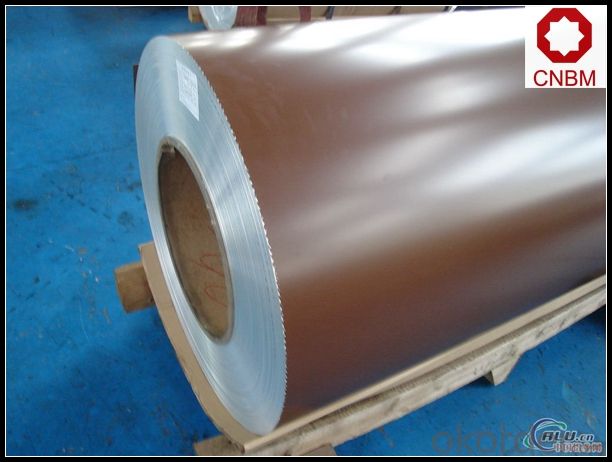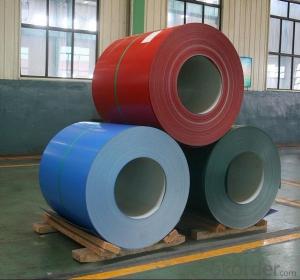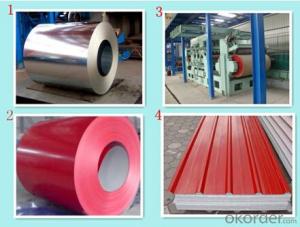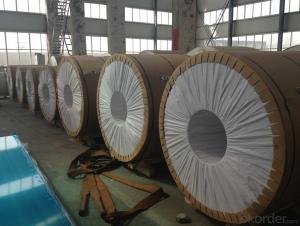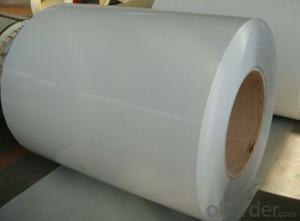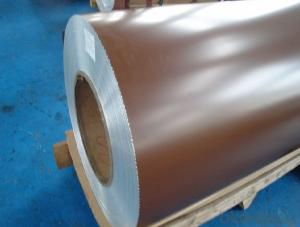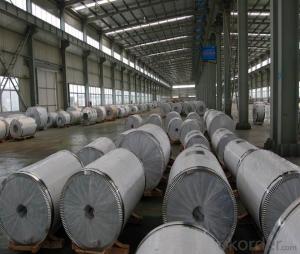Brazing Aluminum Coil - Roofing Ceiling Decorative Alloy Coated Color Prepainted Aluminum Coil
- Loading Port:
- Shanghai
- Payment Terms:
- TT OR LC
- Min Order Qty:
- 5 m.t.
- Supply Capability:
- 10000 m.t./month
OKorder Service Pledge
OKorder Financial Service
You Might Also Like
Specification
1. Specification of Roofing Ceiling Decorative Alloy Coated Color Prepainted Aluminum Coil
Thickness | 0.1mm-10mm |
Popular Thickness | 0.1mm/0.2mm/0.25mm/0.3mm/0.6mm/0.8mm/1.0mm/1.2mm/1.5mm/2.0mm/3.0mm... |
Width | 20mm-2500mm |
inner diameter | 505mm 508mm 605mm |
Material | 1050,1060,1070,1100,1200,3003,3004,3005,5052,5005,5754,5083 |
Temper | O,H12,H14,H16,H18,H22,H24,H26,H32,H34,H36,H38,H111,H112 |
Surface | mill finish |
Packing | Export standard wooden pallets |
Payment Terms | 100% irrevocable L/C at sight or 30% T/T in advance as deposit,70% balance against the B/L copy |
Minimum Order Quantity | 5000kg |
Delivery time | 15-25 days after receiving L/C or deposit |
Remark | Specific requirement of alloy grade, temper or specification can be discussed at your request |
2. Application of Roofing Ceiling Decorative Alloy Coated Color Prepainted Aluminum Coil
(1).Interior: wall cladding, ceilings, bathrooms, kitchens and balconies, shutters, doors...
(2).Exterior: wall cladding, facades, roofing, canopies, tunnels,column covers , renovations...
(3).Advertisement: display platforms, signboards, fascia, shop fronts...
3. Feature of Roofing Ceiling Decorative Alloy Coated Color Prepainted Aluminum Coil
*Such coil is specially designed to replace aluminum ingot, due to the high export tax of aluminum ingot, the coil has better price than ingot.
*This type of coil can fit customer's remelting furnace just like ingot, no need to make any change to the production line that was previously used for ingot. The standard coil size and weight is very suitable for the feed gate of furnace.
*This type of coil causes less material wastage than ingot when remelted.
*Our coil is made directly from ore, no need to go though the ingot making process, quality is much better than other suppliers who use ingot scrap to make coil.
Be free from Oil Stain, Dent, Inclusion, Scratches, Stain, Oxide Dicoloration, Breaks, Corrosion, Roll Marks, Dirt Streaks and other defect which will interfere with use
4. Certificate:
SGS and ROHS(if client request, paid by client), MTC(plant provided), Certificate of Origin(FORM A, FORM E, CO), Bureau Veritas and SGS (if client request, paid by client), CIQS certificate
5. Image of Roofing Ceiling Decorative Alloy Coated Color Prepainted Aluminum Coil
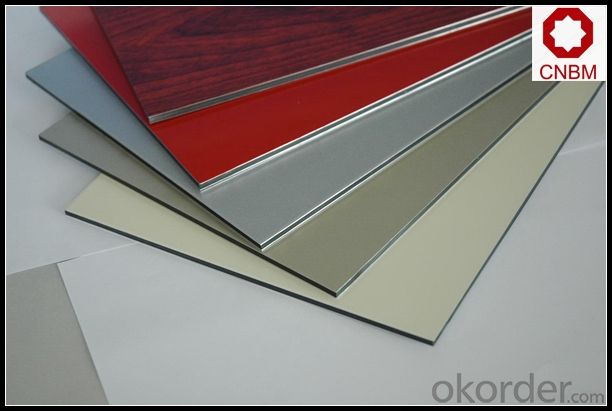
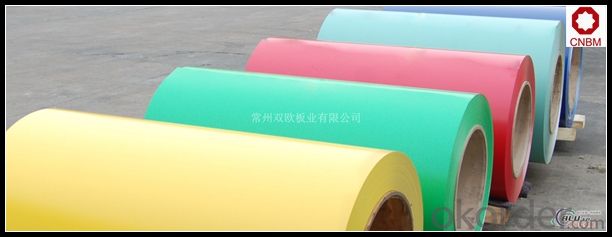
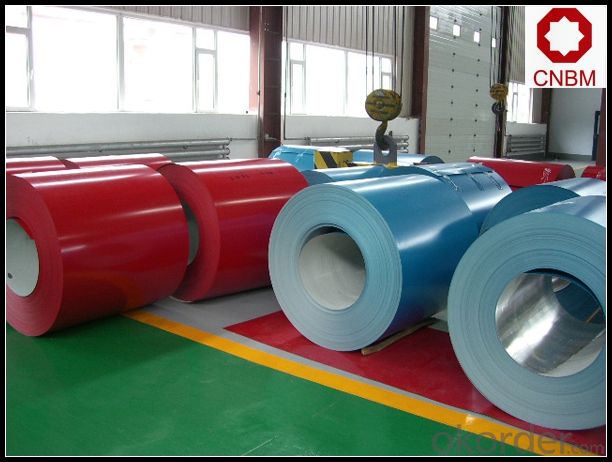
6. Package and shipping of Roofing Ceiling Decorative Alloy Coated Color Prepainted Aluminum Coil
eye to wall
eye to the wall
with wood pallet (wooded case also available)
7. FAQ
1) What is the delivery time?
Dpends on actual order, around 20 to 35 days
2)What is the QC system:
We have QC staff of 20 persons and advanced equipment, each production is with MTC traced from Aluminum ingot lot.
3) What market do you mainly sell to?
Australia, America, Asia, Middle East, Western Europe, Africa etc
- Q: What are the transportation and storage requirements for aluminum coils?
- Transportation and storage requirements for aluminum coils depend on several factors. Firstly, it is important to handle the coils with care during transportation to avoid any damage. They should be packaged securely to prevent any potential scratches, dents, or deformation. The coils should be protected from moisture, as exposure to water or high humidity levels can cause corrosion. During transportation, it is recommended to use appropriate vehicles or containers that can adequately support the weight and dimensions of the aluminum coils. The coils should be properly secured in place to prevent any movement or shifting that could lead to damage. When it comes to storage, it is crucial to store aluminum coils in a clean, dry, and well-ventilated area. Ideally, the storage facility should maintain a stable temperature and humidity level to prevent any adverse effects on the coils. If the coils are stored outdoors, they should be properly covered and protected from direct sunlight, rain, and other weather conditions. Furthermore, it is important to store aluminum coils away from any corrosive materials or chemicals that could potentially cause damage. They should be stored in a manner that prevents contact with other materials, as physical contact can lead to scratching or other forms of damage. Overall, the transportation and storage requirements for aluminum coils involve careful handling, protection from moisture and corrosive materials, proper packaging and securing during transportation, and storage in a clean and suitable environment. By following these guidelines, the integrity of the aluminum coils can be maintained, ensuring their quality and usability.
- Q: Can aluminum coils be used in the production of aluminum foam panels?
- Yes, aluminum coils can be used in the production of aluminum foam panels. Aluminum foam panels are typically made by injecting a foaming agent into molten aluminum, which causes the aluminum to expand and form a foam structure. This foam is then solidified and can be further processed into panels. Aluminum coils are commonly used in various industries, including construction, automotive, and packaging, due to their excellent properties such as lightweight, high strength, corrosion resistance, and thermal conductivity. These properties make aluminum coils suitable for use in the production of aluminum foam panels. To produce aluminum foam panels, the aluminum coil can be processed into a flat sheet or strip, which is then cut into the desired size and shape for the panels. The flat aluminum sheet or strip can be easily handled and processed during the foam production process. The foam-forming agent can be introduced into the molten aluminum, and the expanding aluminum foam can be poured onto the flat sheet or strip to form the panels. The use of aluminum coils in the production of aluminum foam panels allows for efficient manufacturing processes, as the coils can be easily rolled, shaped, and cut to meet specific design requirements. Additionally, the use of aluminum coils ensures that the foam panels maintain the desirable properties of aluminum, such as strength, durability, and light weight. Overall, aluminum coils can be effectively used in the production of aluminum foam panels, providing a versatile and cost-effective solution for various applications, including insulation, sound absorption, and structural components.
- Q: What are the necessary safety measures to take when handling aluminum oxide coated aluminum coils?
- <p>When working with aluminum oxide coating on aluminum coils, it's crucial to follow safety precautions. Always wear appropriate personal protective equipment (PPE), including gloves, safety glasses, and a dust mask to prevent inhalation of dust particles. Ensure proper ventilation to avoid dust accumulation. Handle the material carefully to prevent any skin contact with the coating. Keep the area clean and free from any flammable materials to avoid fire hazards. Be aware of the specific health risks associated with aluminum oxide exposure, and follow the manufacturer's guidelines for safe handling. Regularly inspect equipment for any signs of wear or damage that could lead to accidents.</p>
- Q: Explain the distinctions between cold rolled aluminum coils and hot rolled aluminum coils, focusing on the manufacturing process and resulting properties.
- <p>Cold rolled aluminum coils are produced by rolling aluminum at room temperature, resulting in a smoother surface and tighter dimensional tolerances. They have higher strength and hardness due to cold working. Hot rolled aluminum coils, on the other hand, are rolled at high temperatures, which allows for larger thickness reductions and creates a rougher surface. Hot rolled coils are generally softer and more ductile, with lower strength and hardness compared to cold rolled coils. The choice between the two depends on the specific application requirements for strength, surface finish, and formability.</p>
- Q: This question asks for methods to assess the quality of aluminum coils, which is important for various industries that use aluminum for manufacturing and construction.
- <p>To check the quality of aluminum coils, you should inspect for surface defects such as scratches, dents, or discoloration. Measure the thickness and width to ensure they meet specifications. Test the hardness and tensile strength to verify mechanical properties. Conduct a chemical analysis to confirm the alloy composition. Check for internal defects using non-destructive testing methods like ultrasonic testing. Assess the coil's flatness and straightness to prevent issues in further processing. Finally, ensure proper packaging and storage conditions to maintain coil quality.</p>
- Q: How do aluminum coils compare to fiberglass coils in terms of weight?
- Aluminum coils are generally lighter in weight compared to fiberglass coils. Aluminum is known for its lightweight properties, making it an ideal choice for various applications, including coil manufacturing. Fiberglass, on the other hand, tends to be denser and heavier than aluminum. This weight difference can have several advantages when it comes to installation and transportation. Lighter aluminum coils are easier to handle, require less effort to install, and can be more cost-effective in terms of shipping and logistics. Additionally, the reduced weight of aluminum coils can contribute to overall energy efficiency in HVAC systems, as it requires less power to move and circulate air through the coils. However, it's worth noting that the weight comparison between aluminum and fiberglass coils may vary depending on the specific design and thickness of the materials used.
- Q: How are aluminum coils tested for quality assurance?
- Aluminum coils are tested for quality assurance through various methods such as visual inspections, dimensional checks, mechanical testing, and chemical analysis. These tests ensure that the coils meet the required specifications and standards, ensuring their quality, durability, and performance.
- Q: Can aluminum coils be used in the production of solar panels?
- Aluminum coils are indeed suitable for the production of solar panels. Being a lightweight and durable material, aluminum brings numerous advantages to the manufacturing process. Its high conductivity and exceptional thermal properties enable efficient dissipation of heat. Furthermore, aluminum exhibits resistance to corrosion, a vital characteristic for solar panels as they encounter diverse weather conditions. Moreover, the cost-effectiveness of aluminum makes it a favored option in the solar industry. By employing aluminum coils in solar panel production, the performance, durability, and cost-effectiveness of these panels are greatly improved.
- Q: How do aluminum coils perform in corrosive environments?
- Aluminum coils perform exceptionally well in corrosive environments due to their natural resistance to corrosion. The formation of a thin, protective oxide layer on the surface of aluminum coils helps prevent further corrosion from occurring. This property makes them highly suitable for applications exposed to moisture, chemicals, and other corrosive agents.
- Q: Which is more unhealthy the bleached parchment paper or the aluminum from the pan?
- it would depend on what you're making i'd assume
Send your message to us
Brazing Aluminum Coil - Roofing Ceiling Decorative Alloy Coated Color Prepainted Aluminum Coil
- Loading Port:
- Shanghai
- Payment Terms:
- TT OR LC
- Min Order Qty:
- 5 m.t.
- Supply Capability:
- 10000 m.t./month
OKorder Service Pledge
OKorder Financial Service
Similar products
Hot products
Hot Searches
Related keywords
